| Area | Shasta |
| Topic | Tour: Shasta Restoration Challenges |
This large cottonwood tree shows signs of severe beaver damage to the left in this photo. This tree is on the Marion Ranch near county road A-12 along the Shasta River. Beaver are still common on the Shasta River and new tree starts have little chance of surviving without cages to protect them from beavers.
The pile of cut grass at the bottom center of the photo is the beginning of a mouse nest. Mice have chewed the bark off the willow starts in the photo at center and left. Vexar tubes slightly embedded in the ground seem to keep this problem to a minimum.
The willow start in the foreground (slightly out of focus) has been subjected to cattle grazing while starts protected by the fence are growing vigorously.
This aerial photograph shows an off-stream storage reservoir with Big Springs Creek in the background. The water for this impoundment is extracted from Big Springs Creek and flow depletion may decrease viable spawning and rearing habitat for salmon and steelhead.
This section of the Shasta River near Louie Road is over grazed, which contributes to stream warming and reduces the filter capacity of the riparian zone. Stock waste may also directly contribute to water quality degradation.
Dwinell Dam as it appeared in 1992. The irrigation ditch seen at left in the photo provides water from Lake Shastina for agriculture on the east side of the Shasta Valley in the general vicinity of Montague, over 20 ditch miles away.
Tailwater from agricultural land often enter the Shasta River flowing very warm and nutrient rich. This can elevate stream temperatures and decrease water quality both of which negatively effect salmonids.
Diversion dams on the Shasta River may impede migration of adult or juvenile salmon and steelhead. The impoundments created upstream of diversions may also be nutrient traps and these areas are subject to dissolved oxygen sags (see Gwynne,B. 1993: Investigation of Water Quality Conditions in the Shasta River,
in Bibliography).
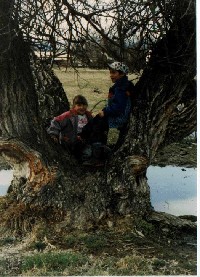 Click on image to enlarge (65K).
Click on image to enlarge (65K).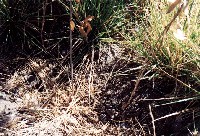 Click on image to enlarge (132K).
Click on image to enlarge (132K).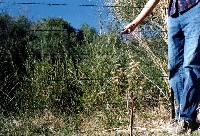 Click on image to enlarge (135K).
Click on image to enlarge (135K).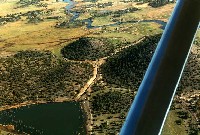 Click on image to enlarge (64K).
Click on image to enlarge (64K).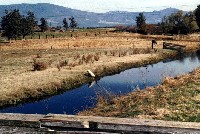 Click on image to enlarge (91K).
Click on image to enlarge (91K).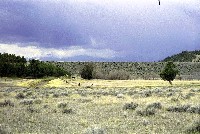 Click on image to enlarge (66K).
Click on image to enlarge (66K).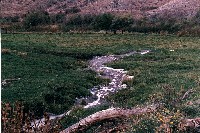 Click on image to enlarge (115K).
Click on image to enlarge (115K).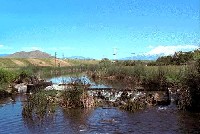 Click on image to enlarge (24K).
Click on image to enlarge (24K).
To learn more about this topic click Info Links
To view additional information (data source, aquisition date etc.) about this page, click Metadata
| www.krisweb.com |
